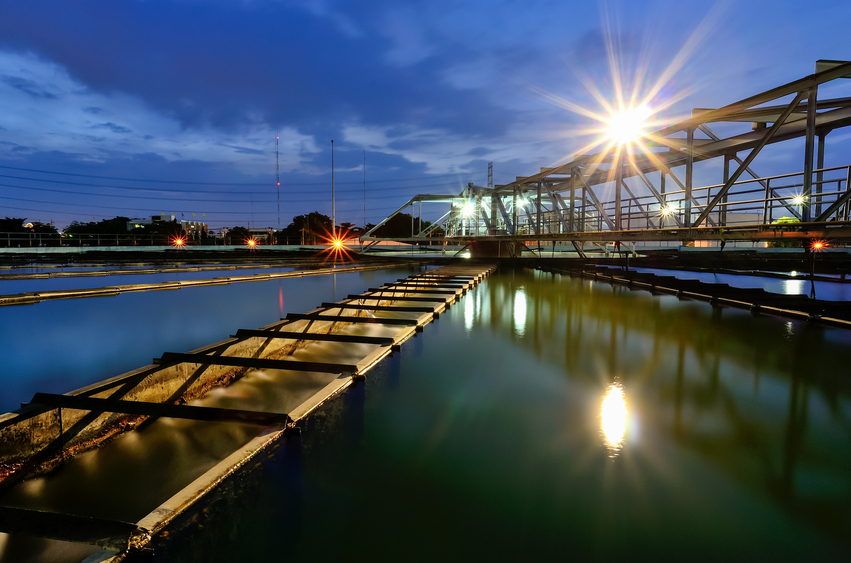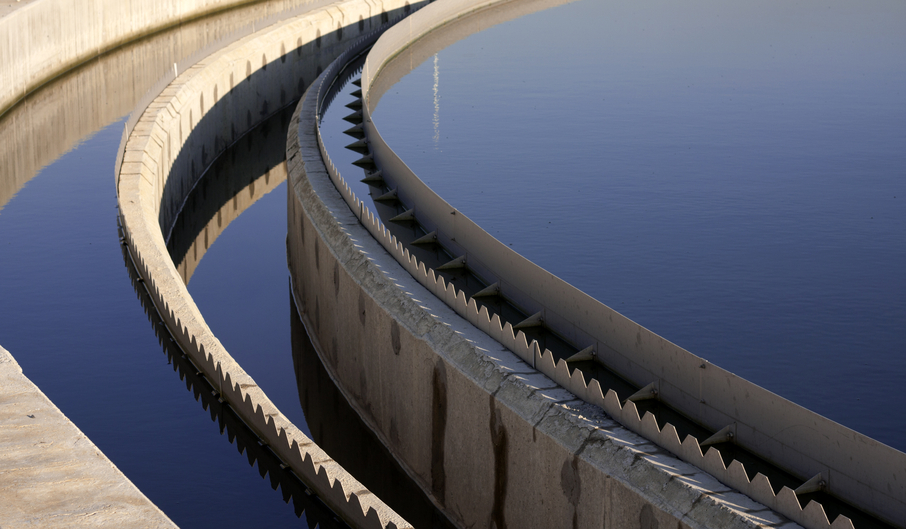Nebraska Wastewater and Ethics 7 PDH Discount Package 1
Centralized Wastewater Treatment for Facilities Managing Oil and Gas Extraction Wastes: Wastewater Characterization and Management (C02-077)
Pressure and Gravity Sewers (C02-068)
Engineering Ethics for Nebraska Professional Engineers (NE1-001)

This online engineering PDH course will introduce you to processes and equipment for primary treatment of wastewater. You will be introduced to descriptions, functions and design considerations for sedimentation tanks and clarifiers, chemical precipitation, and Imhoff tanks. You will learn how the primary treatment processes works together with the preliminary, secondary, tertiary and sludge handling processes to form a complete wastewater treatment plant.
Wastewater treatment is usually characterized as consisting of four sequential processes: preliminary, primary, secondary and tertiary treatment.
This 2 PDH online course is intended for civil, environmental and chemical engineers as well as construction professionals seeking an introduction to primary wastewater treatment.
This PE continuing education course is intended to provide you with the following specific knowledge and skills:
- Understanding the function of primary sedimentation
- Learning about sedimentation tank design parameters
- Learning about detention time for sedimentation tanks and clarifiers
- Learning about weir loading rates for sedimentation tanks
- Learning about sludge and scum collection for rectangular and circular sedimentation tanks
- Learning how to calculate sedimentation tank size
- Learning about chemical precipitation using aluminum and iron salts, lime, and polyelectrolytes
- Learning how to calculate sludge production using chemical addition in primary sedimentation
- Understanding the functions and features of Imhoff tanks
- Understanding the typical characteristics of domestic sewage sludge
In this professional engineering CEU course, you need to review the course document titled, "An Introduction tp Primary Wastewater Treatment".
Upon successful completion of the quiz, print your Certificate of Completion instantly. (Note: if you are paying by check or money order, you will be able to print it after we receive your payment.) For your convenience, we will also email it to you. Please note that you can log in to your account at any time to access and print your Certificate of Completion.

This online engineering PDH course investigates whether the current Centralized Wastewater Treatment (CWT) Effluent Limitations Guidelines and Standards (ELGs) are adequately managing wastewater discharges from CWT facilities accepting oil and gas extraction wastes.
The EPA collected and evaluated data regarding oil and gas wastewater characteristics, as well as data characterizing discharges from CWT facilities accepting oil and gas extraction wastes, which are presented in this course.
The exploration, development and production of oil and gas reserves vary markedly from region to region. There are a number of solid and liquid waste materials generated during oil and gas exploration, extraction and production, and these waste materials may be managed by CWT facilities. The nature and characteristics and quantity of the wastes generated depend upon a number of factors, such as the type of drilling, the characteristics of the formation, the depth of the well and the type and quantity of chemical additives used during drilling, production and well maintenance activities.
This 2 PDH online course is intended for chemical, petroleum, environmental and industrial engineers as well as other interested in understanding the wastewater characterization and management used at CWT to treat oil and gas extraction wastewaters.
This PE continuing education course is intended to provide you with the following specific knowledge and skills:
- Familiarizing with the basics of the wastes that are discharged from oil and gas extraction activities
- Familiarizing with pollutants that are considered for evaluation in drilling wastewater
- Gaining an overview of the additives used in well development along with their purpose
- Familiarizing with pollutants that are considered for evaluation in produced water
- Familiarizing with characterizing the concentrations of pollutants in process wastewater discharges
Upon successful completion of the quiz, print your Certificate of Completion instantly. (Note: if you are paying by check or money order, you will be able to print it after we receive your payment.) For your convenience, we will also email it to you. Please note that you can log in to your account at any time to access and print your Certificate of Completion.

This online engineering courses is divided in to two parts: The first part discusses sewer systems that use pressure to deliver sewage to a treatment system. The second part discusses small diameter gravity sewers (SDGS) which convey effluent by gravity from a tank to a treatment location. Each part presents an overall description of the relevant topic along with the advantages and disadvantages of each system, design criteria, performance data, operation and maintenance and insights about cost related data.
Alternative wastewater collection systems can be cost effective for homes in areas where traditional collection systems are too expensive to install and operate. Pressure and gravity sewers are used in sparsely populated or suburban areas in which conventional collection systems would be expensive. These systems generally use smaller diameter pipes with a slight slope or follow the surface contour of the land; thereby, reducing excavation and construction costs. These systems convey effluent by gravity from an interceptor tank (or septic tank) to a centralized treatment location or pump station for transfer to another collection system or treatment facility.
This 2 PDH online course is applicable to civil, mechanical and environmental engineers, as well as design and construction personnel involved with the planning, design and installation of low pressure and small diameter gravity sewer systems.
This PE continuing education course is intended to provide you with the following specific knowledge and skills:
- Learning about the common types of alternative wastewater collection systems
- Understanding the advantages and disadvantages of each type of system
- Understanding the applicability of each system
- Familiarizing with the design criteria, performance data and operation and maintenance processes of each system
- Ability to compare conventional wastewater collection systems to alternative wastewater systems
Upon successful completion of the quiz, print your Certificate of Completion instantly. (Note: if you are paying by check or money order, you will be able to print it after we receive your payment.) For your convenience, we will also email it to you. Please note that you can log in to your account at any time to access and print your Certificate of Completion.

This online engineering PDH course presents the laws and rules of ethics and professional responsibility governing the practice of engineering in the State of Nebraska. Title 110, Chapter 5, “Code of Practice”, of the Nebraska Rules and Regulations of the Rules, which relate to the laws and rules of profession conduct are presented in this course.
Engineering ethics is (1) the study of moral issues and decisions confronting individuals and organizations involved in engineering and (2) the study of related questions about moral conduct, character, ideals and relationships of peoples and organizations involved in technological development (Martin and Schinzinger, Ethics in Engineering).
Since engineers are faced with frequent moral and ethical dilemmas while practicing their engineering profession, this course will provide you with moral and ethical guidance in your decision making process. Most importantly, it will provide you with insight on how to conduct, respect and protect your engineering practice with the utmost professionalism.
This 1 PDH online course is applicable to Professional Engineers licensed in the State of Nebraska and who are required to demonstrate continuing professional competency in engineering ethics as a condition of their license renewal. For each renewal period, every licensee must complete thirty (30) professional development hours, at least one (1) of which must be relative to the principals of professional responsibility, conduct and ethics.
This PE continuing education engineering course is intended to provide you with the following specific knowledge and skills:
- Understanding the Nebraska laws and rules regulating the practice of engineering in the State of Nebraska and their application to Professional Engineers
- Understanding the rules of professional conduct and responsibility, code of practice and engineering ethics
- Familiarizing with the Nebraska Board disciplinary process and the various violations and corresponding penalties imposed by the board
In this professional engineering CEU course, you need to review the course document titled “Engineering Ethics for Nebraska Professional Engineers”.
Once you complete your course review, you need to take a multiple-choice quiz consisting of ten (10) questions to earn 1 PDH credit. The quiz will be based on the entire course document.
Upon successful completion of the quiz, print your Certificate of Completion instantly. (Note: if you are paying by check or money order, you will be able to print it after we receive your payment.) For your convenience, we will also email it to you. Please note that you can log in to your account at any time to access and print your Certificate of Completion.